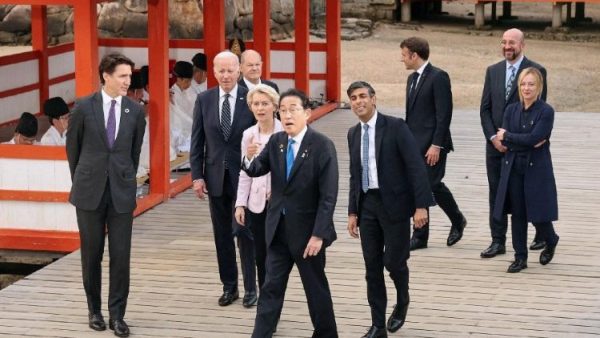African Bishops urge G7 to cancel "unpayable" debt
 As the G7 meets in Hiroshima, Japan, the bishops representing Caritas organizations of 23 African nations appeal the governments of the seven of the seven key industrial countries, to deliberate concrete measures to help Africa address food and climate crisis and ever-growing poverty.
As the G7 meets in Hiroshima, Japan, the bishops representing Caritas organizations of 23 African nations appeal the governments of the seven of the seven key industrial countries, to deliberate concrete measures to help Africa address food and climate crisis and ever-growing poverty.
Catholic Bishops at the head of Caritas in Africa have urged the leaders of the G7, meeting in the Japanese city of Hiroshima for their annual summit, to take bold action to support African nations struggling with poverty, including the cancellation of “unpayable” debt, increased aid, and fairer trade policies.
The three-day summit bringing together Heads of State and of Government of the world's advanced democracies (United States, Canada, Japan, France, Germany, Italy, and the United Kingdom) kicked off on Friday, May 19, with an agenda focused on Russia's aggression against Ukraine, nuclear disarmament and non-proliferation, climate change, development, food security and global health in the wake of the COVID-19 pandemic.
Growing food insecurity in Africa
Ahead of the meeting, the bishops representing Caritas organizations of 23 African nations have appealed the governments of the seven most developed countries to deliberate concrete measures to help Africa address the multiple crises it is currently facing.
In the statement, the bishops voice their deep concern over the increasing poverty in in Africa, which has worsened since the COVID-19 crisis. Growing levels of food insecurity, they say, are exacerbating conflict and social tensions in many African countries “making governance more fragile”.
“Last year, over 300 million people experienced food insecurity, exacerbating drivers of conflict and social tension in many African countries and making governance more fragile.”
"Unpayable” debts
Hence the urgent need to alleviate what the Caritas Bishops term as “unpayable” debts, which, they write, requires reconnecting debt relief and human development needs, securing an automatic debt standstill, covering all creditors, and making debt relief accessible to all developing countries in need.
The statement warns that without new sources of affordable finance for development, African countries facing “immense social and environmental challenges” are likely to fall back into the vicious circle of debt.
Need for financial reform along ethical lines
According to the African Bishops, it is therefore, essential to rethink International Monetary Fund’s Special Drawing Rights (SDR) “as an instrument of finance, and rechannel a significant portion of those held by wealthy countries to Africa”. SDRs are an international reserve asset created in 1969 by the IMF to supplement the official reserves of its 180 member states which can be used to provide a country with liquidity if a crisis arises.
While lauding the allocation of 650 billion US dollars in SDRs with support by the G7 countries as “a significant move to provide pandemic crisis relief without adding to the debt burden of countries”, the bishops insist on the urgent need for higher financial resource contributions from wealthier States and for a change in the current global economic policies, reiterating Pope Francis repeated calls “for financial reform along ethical lines that would produce in its turn an economic reform to benefit everyone".
“Multilateral development banks are extraordinary tools to finance human development and climate, especially in times of crises when other lenders shut their access. But, to operate at the scale needed to effectively meet the present challenges, they will have to receive higher resource contributions from members, and change the policies and rules that govern capital use.”
Rekindling hope for Africa
“Rekindling hope and promise for Africa and its future generations requires action from the international community”, the statement concludes. “We believe that by working together, we can ensure that Africa receives the assistance it requires to overcome these crises and build a brighter future for all”.
Lisa Zengarini
Source: vaticannews.va

